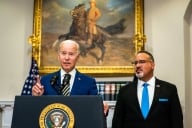You have /5 articles left.
Sign up for a free account or log in.
LAS VEGAS -- After a year watching the hype over massive open online courses and keeping its distance, Blackboard said Wednesday it would join in.
The company, which is by far the largest provider of classroom management software to American colleges, said it would provide free MOOC hosting for its existing customers, which already use Blackboard for their for-credit courses.
The company is also taking a dig at revenue-sharing agreements the main three MOOC providers -- Coursera, edX and Udacity -- are asking their partner universities to sign. In an interview, Ray Henderson, Blackboard's president of academic products, called the revenue-sharing agreements MOOC providers are asking for "onerous" and "aggressive." While Blackboard will not charge its existing customers to host MOOCs that are free and not for credit, the company expects colleges that use its MOOCs will want additional services, for which the company will charge.
In trying to get a piece of the MOOC action, the company said it was playing to its 16-year history developing classroom software.
Katie Blot, the president of Blackboard education services, argued the company was better positioned to help educators than are newcomers like Coursera, the largest MOOC provider.
“I know people are touting four million users,” she said, a reference to Coursera, which has that many. “You’re going to get a platform today that supports over 40 million users.”
The company views MOOCs as one form of online education but not the only one. Blot said the company stayed on the sidelines because it wanted to understand why colleges were excited about MOOCs. Now, Blackboard thinks colleges are offering MOOCs for three reasons.
First, they want to provide educational material to a broad audience that otherwise would not come to campus.
Second, Blot said colleges want to experiment with new forms of online teaching -- Blot called MOOCs a playground for colleges. She argued that colleges that opt to use Blackboard to offer free MOOCs can easily take lessons they learn from those experiments with MOOC students and apply the findings to traditional online classes, which are typically offered to a few dozen students at most and can cost as much if not more than on-campus classes.
Third, colleges want to showcase star professors and give a “free taste” to the public in an attempt to lure would-be students.
The MOOC announcement came here at the company’s convention, known as Bb World. It is attended by more than 2,500 people, mostly higher ed and K-12 IT workers or supervisors.
This year’s keynote speech was meant to showcase Blackboard CEO Jay Bhatt, who joined the company about seven months ago. He said he spent the months thinking about the direction the company should take.
“I think what people want is changing and what they expect from their education experience is changing as well,” Bhatt told a full ballroom at the Venetian Las Vegas resort and casino.
He said the company plans to invest more in development, has worked to integrate the company's sometimes disparate product offerings, has taken the "handcuffs" off its creative staff and is going to do a better job dealing with customers. A few attendees said they had better experience with Blackboard's customer service teams and that they -- and the faculty they work with -- had already noticed improvements in the platform since Bhatt joined the company.
In an interview after the keynote, Bhatt said investments made by the company two and a half years ago were starting to pay off now. He said continued investments are aiming to prod faster product delivery, hire more computer scientists to work on the platform, upgrade the user interface and user experience for faculty and students, and anticipate next generation demands from the education community.
Bhatt, like some others who have worked in ed tech for years, expressed some frustration with all of the attention MOOCs have received -- which he blamed in part on the press. He said colleges that have been offering online distance ed for years tell him MOOCs are nothing novel. "It's not a denial issue," he said. "It's a let's tell the whole story of the online movement."
And, like others, he wondered what MOOC providers' business ultimate model is. "I don't know where they're going to be," he said. "I don't think they know where they're going to be -- they just have a lot of venture capital money."
The conference was not without its Vegas touches. During her part of the keynote presentation, Blot referenced a MOOC drinking game that had been talked about on social media sites by conference-goers. Then she said the word MOOC several times -- enough to get someone tipsy if they were playing along.
David Garibaldi, who was popular on the TV show "America’s Got Talent," opened the keynote by painting the Blackboard logo and the face of Einstein on the main stage.
At the end of the keynote, after talking about the company's plans for the future, Bhatt stood in front of the painting and said, “I think Dr. Einstein has started to smile based on what he’s heard.”








